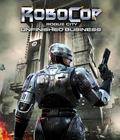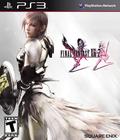When we last left our hero, he was two-thirds into the original Final Fantasy XIII — a game which, while containing several good and progressive ideas, contained just as many flaws. Worse yet, those flaws varied from person to person due to differing gaming tastes, to the point where role-playing gamers are still writing articles about how FFXIII ruined their lives. I don't regret playing it, but it's become impossible for me to objectively defend when it comes under fire.
Thus, equipped with the powers of hindsight, I went once more into the breach, this time with much reservation. At best, I expected a somewhat disappointing retread; at worst, it would be a desperate cash-grab. What I got was a Chrono-series game for the current generation of consoles, and I mean that in an overwhelmingly positive way.
I'm not complaining. I've wanted one of these for years.
Final Fantasy XIII-2 technically takes place after Final Fantasy XIII, but the game deftly keeps this from being a problem in two ways. First, there's a detailed primer accessible from the main menu that goes through the plot of the first game, chapter by chapter, to get new players up to speed. Secondly, the game does everything it can in terms of plot, cast and especially scope, to distance itself from its predecessor. To put it in Final Fantasy VII terms, the first game was this game's Midgar.
This game comes packaged with a lot of good news, so we'll start with that. Every single complaint fired at Final Fantasy XIII — of which there were many — has been addressed with style to spare. The battle system, which was already the best and most addictive part of that game, has been made faster and more flexible, with character switching implemented. Battle performance rankings now actually have significance. All of the roles and upgrade systems are open from the get-go for the player to experiment with as he pleases; all of XIII's hand-holding has been excised. Want to be level 99 in everything? No longer will it take a million years like in the previous game. Enemies, meanwhile, have been given overall power upgrades to compensate, giving rise to early-game battles that are comparable in scale to XIII's late-game ones; it makes battles even more of a rush.
On the subject of rushes, a new pre-battle system has been implemented in the form of the Mog Clock, which gives players a chance to easily perform preemptive attacks at the start of a battle via real-time sword slashes. Success weakens enemies at the start of combat and automatically casts Haste on your party. This makes huge inroads into speeding up the grinding process, which is something I'd like RPG developers to try more often. Fun and fast battles reduce the "padding" in games of this genre and can make them better overall experiences.
Joining you in battle this time around are overworld monsters which, gameplay-wise, are full-fledged characters with their own upgrade trees and move sets. These monsters, once tamed in the field through combat, act as your third party members and are swappable in the field menu. The vast number of available monsters allows for some dynamic party combinations that weren't possible in the original XIII. You can also have monsters consume other monsters to combine their powers.
The final element of battles is the Cinematic Actions, which are really just Quick Time Events (QTEs). In just about every other game, these are a terrible idea because you are punished for failing them. Not so here, and furthermore, you are rewarded for completing them correctly and can retry them after completing certain requirements, so they're welcome additions instead of chores.
Outside of combat, Square Enix answered the clamors of people who missed towns in XIII without completely abandoning the linear set piece-based progression of that game. That answer comes in the form of the Historia Crux. Several of Final Fantasy XIII's most significant areas (including a few new ones) are all linked together by gates to different time lines, which the two main characters travel through on their world-saving quest and are unlocked as the game progresses. Sometimes alternate-universe variations of a territory and time line can also be uncovered. The great thing about the Crux is that it uses the principles of cause and effect to provide each territory with multiple personalities, making the old new and fun to explore repeatedly. They may still be time sinks, but at least they're now interesting time sinks with plenty of secrets to uncover and reasons to revisit them.
With the core game being so much fun to play, it's a shame that the story is where most of the flaws are — especially since it's in a genre where story is given more weight. These flaws come in two varieties. For a story that involves saving a planet via hopping through space and time, it sure takes a while to get going. The first two-thirds of the game provide a decent amount of technobabble in place of explaining the true stakes of your situation. Even early motivations aren't effectively communicated to the player for the longest time, such as an impending cataclysm involving FFXIII's Cocoon crashing to earth or Noel coming from a future where he is the last human alive. Twenty hours is a long time to be asked to take virtual characters at their word. It's almost as if Square Enix was afraid to play its plot hands too early, but it really shouldn't have been. When everything is finally revealed, the plot and stakes are gripping and will easily drive players to finish the game and explore the post-game content, which consists, Chrono Trigger-style, of about 10 endings, as well as story DLC coming down the pike.
The good news is that playable characters Noel and Serah do an exemplary job of propping up even the slow parts of the narrative. As these two chrononauts hop around time and space like a junior Doctor Who duo, Noel plays the role of a refreshingly angst-free, no-nonsense hero who thinks with both his mind and his heart. His personality and motivations make him easily one of the best leads Final Fantasy has sported; he's someone you'd want to have by your side instead of trying to find his mute button. Serah, coming from humbler beginnings than Noel, is understandably unsure of herself at first, but eventually builds into a strong heroine who can provide perspectives and solutions to problems that Noel never could on his own. Lightning may be cooler overall, but her sister definitely has her own chops. Taken on their own merits, these two characters are a credit to the genre; unfortunately, the original game had a cast that was just as lovable yet three times as large, and this is where we come to the narrative's other flaw. Even with meaningful cameos and sometimes even assists from XIII's cast, their absence is easily felt by those who played the original and managed to bond with them. If you're coming to this game fresh, however, it's a moot point.
XIII-2's visuals are a positively leaning mixed bag. The game doesn't look quite as good resolution-wise as its prequel, and it suffers from a low frame rate in many spots (it's worth noting that the PS3's frame rate is still better), but it's obvious how the engine is being taxed, as there are battles and bustling towns that dwarf the scale of anything presented in the original game. The game stutters at times, but if this is the price one pays to explore a towering and beautiful techno-paradise or huge rolling fields, then so be it. The music, on the other hand is extremely experimental, delving into genres like hip-hop, techno and even death metal to accompany Final Fantasy's classic orchestral style. It consists of far more hits than misses, but old-school FF fans will probably decry it as the worst FF soundtrack yet, especially once they hear the new best Chocobo theme ever. I'm not even kidding. I love this song. Voice acting, however, is still exceptional.
All of the elements we've talked about up until now combine to create an RPG with its own identity. Where FFXIII swerved sharply off the beaten path for traditional RPGs, Final Fantasy XIII-2 takes the traditional and enhances it with unique elements and polish all around under the hood, if not entirely on the surface. Instead of playing it safe and going by the numbers, it's a game that feels fun to dig into, tinker around with, or play normally. FFXIII-2 earns its score with aplomb, and I'd go so far to call it a sleeper hit. It's a genuinely great-playing game with an imperfect story, though to its credit, it eventually engages and justifies the wait. Its greatest battle now is escaping from the shadow and stigma of its big brother, but you should ignore the anti-hype, take a leap of faith and give it a chance. You might be surprised at how much fun you have.
Score: 8.8/10
More articles about Final Fantasy XIII-2











 The unfolding drama of Final Fantasy XIII continues in Final Fantasy XIII-2. Explore a richly developed world featuring both new and familiar faces, and an exciting and highly developed strategic battle system. In this ongoing saga, the future is about to change...
The unfolding drama of Final Fantasy XIII continues in Final Fantasy XIII-2. Explore a richly developed world featuring both new and familiar faces, and an exciting and highly developed strategic battle system. In this ongoing saga, the future is about to change... 








































